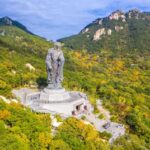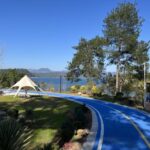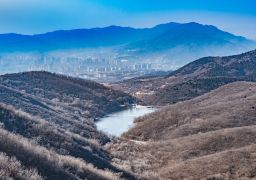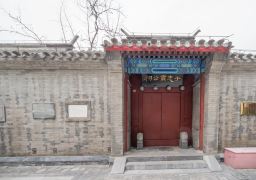Longchuan Bay is a primary attraction located in the southwest lake area of Thousand Island Lake, approximately 42 kilometers away from the town of Thousand Island Lake in Jiangjia Town. It is a peninsula known for its tranquility and distinct wetland scenery compared to the eastern part of the lake.
Overall, Longchuan Bay is a combination of wetland landscapes and the culture of educated youth who were sent to the countryside during the Cultural Revolution. The peninsula’s wetland lakes, coupled with lush ancient forests, create an extremely beautiful scenery. Especially in autumn, the trees are splendidly colored.

The natural scenery area is quite extensive, allowing for walking, and when tired, there are electric carts that stop on demand, included in the ticket price, to travel between the main scenic spots. There are also boats available for sightseeing. Among them, Manghua Yang is a particularly beautiful part of Longchuan Bay’s natural scenery, not far from the entrance, with mountains, forests, and lakes forming a picturesque landscape. In autumn, Manghua Yang is rich in color, with a large expanse of blooming reeds, the reflection of the lake, and the foreground of the meadow, creating a strong sense of oil painting. In the afternoon, the reeds shine brightly against the sunset. It is not only suitable for strolling but also for photography.

Following the main tour route to Sanli Pavilion, this is the transfer station of the scenic area. Turning left leads to the ’80s Commune, and going straight leads to the ’70s Commune. The path to the ’70s Commune is a long, shaded forest path, with trees planted by the educated youth of that time and the road is the original machine-tilled path. There is a Star Picking Platform halfway up, from which one can overlook the scenery of Longchuan Bay. The ’70s Commune is surrounded by water on three sides and has a beautiful view.

The scenic area has built some exhibition halls on the basis of the original old educated youth houses, canteens, and workshops, displaying many old photos and objects donated by the educated youth who came here during that time, allowing visitors to feel the life and work of the educated youth at that time. If you have experienced that era, you will definitely recall your youth here.
Children under 2 meters (inclusive) or under 6 years old (inclusive) (with original ID card or household register), free of charge. Minors with a height of 1.2 meters (exclusive) to 1.5 meters (inclusive) or between 6 and 18 years old (inclusive) (with ID card or household register), discounted tickets. Elderly people over 70 years old (inclusive) (with original ID card, limited to mainland, Hong Kong, Macao and Taiwan regions), free of charge. Elderly people between 60 and 69 years old (inclusive) (with ID card, limited to mainland, Hong Kong, Macao and Taiwan regions), discounted tickets. Students: Full-time undergraduate and below students (with student ID cards from mainland, Hong Kong, Macao and Taiwan regions), discounted tickets. Journalists: With press cards issued by the General Administration of Press and Publication, discounted tickets. Supplementary note:









